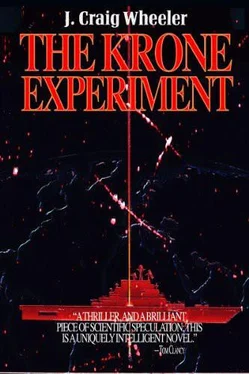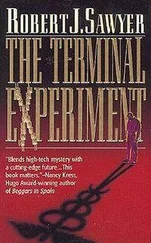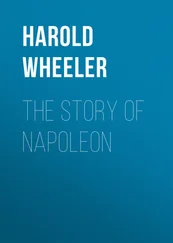Kathleen Huddleston was in the outer office. “Here’s the last of it,” he said to her. “I sure appreciate your staying late.”
She acknowledged his gratitude with a smile and flipped expertly through the pages. “This will just take a few minutes. It’ll be on Drefke’s desk when he comes in in the morning.”
“Great,” Isaacs replied.
He locked his office for the night, waved goodbye to Kathleen who was busy in front of the screen of her word processor and headed for the stairs. As he walked, his mind whirled with images of the fateful moment, the target of the gargantuan effort outlined in the report.
At zero hour the lasers would be triggered and the tiny hurtling particle would be immersed in a carefully designed cocoon of photons. In lightning response, the hole would emit a corresponding burst of particles and energy in rapid cascade and shrink a fraction in size. From the distance of the monitoring flotilla, this unprecedented set of events would look similar to another man-made holocaust.
Information of the blast would be fed nearly instantaneously to nerve centers around the world. Within hours it would be known whether the experiment was a success, whether the energy released and the shrinkage of the hole were as expected, or not. Only then would they have some concrete basis for the hope that the mass of the hole could be peeled away, little by little, that the orbit could be shifted until the menace was free of the Earth.
As Isaacs descended the stairs, he thought of the arguments he had heard from Runyan, Humphreys, Phillips, and Korolev. He trusted these men and believed them when they argued that this was the only rational approach, but their descriptions of the possible pitfalls were deeply troubling. The response of the hole was predicated on deductions from Krone’s data concerning previously unknown effects. Great effort would be put into developing theories to interpret the Krone experiments, but these theories could not be tested except by the ultimate event itself.
If the current expectations were overoptimistic, the experiment could be a dud, the black hole continuing on its rapacious path. They could err in the opposite sense. If too much mass were liberated from the hole, too much energy released, the explosion could be catastrophically powerful, threatening the Pacific basin with deadly tsunamis and perhaps the whole Earth with climactic changes.
Even if the expectations were correct, the required engineering feats were enormously complex. If the aim of the laser were not perfect, the black hole might be kicked inaccessibly beneath the Earth’s surface rather than boosted further above it.
Uncontrollably, Isaacs brooded on the implications if the experiment should fail. The warp and woof of human affairs were woven on a tapestry of time, comfortably stretched by geologists and astronomers to billions and billions of years. How would humanity change if the future were known to be abbreviated, longer than a single human life, but grimly truncated? Isaacs began to think of the future in its possible shortened version. Earthquakes beginning in several hundred years, growing ever stronger, more devastating. Then in several tens of thousands of years—nothing. A Sun, eight planets, and a small, dark marble.
Isaacs found himself in the foyer, headed outside. It was early on a spring evening as he pushed out through the door. No one was around as he paused at the head of the steps. The glass door swung shut behind him and the rubber, steel, and oil smell of man was replaced by the sweetness of growing things. The warm, heavily scented air engendered a feeling of being tugged gently but firmly downward, as if by a languid lover, but his eyes rose to the multitude of stars winking on in the deepening dusk.
An oasis, he thought. There must be another.
His eyes searched the bright points for a sign of welcome.
EPILOGUE: Three Years Later
Alex Runyan responded groggily to the rap on his cabin door. I’m getting too old for this, he thought to himself. Then the significance of the day awoke in him like a spreading spark. He sat up, fumbled for the light, switched it on and fell back on the bunk, eyes in a tight squint, the light filtered blood-red through his lids. He lay for a moment feeling the gentle roll of the ship, to which he had never gotten quite accustomed. The USS Bradford, a Navy frigate, single shaft, displacing twelve hundred tons and rigged for research duty, had been his home for six weeks. He estimated he had logged a total of eight months of sea duty in bits and pieces since the project had gotten into full swing. He still preferred a floor that stayed where you aimed when you took a step. He swung his legs over the side of the bunk, grabbed his pants off the floor where he had discarded them only a scant few hours before and stood up. He leaned over and picked up one foot, preparing to thrust it into the trouser leg, but the slow tilt of the deck threw him off balance. He braced himself with one arm on the bulkhead and struggled awkwardly, failing to get a foot in the floppy denims while he held them with just one hand. He grabbed the trousers with both hands, lifted a foot, and was tilted off balance again. This time he was slow to drop the pants and reach for support. He smacked his head against the shelf over his bunk.
“Goddamnit!” he swore at the offending protrusion. Chagrined, he sat down on the bunk to put the pants on like any landlubber. ‘Everything’s tougher at sea,’ he laughed to himself as he stood to hoist the pants, zip the fly, and fasten his belt. Then he sat again to shove his feet into sneakers and lace them up. That was one of the first things the Navy types told him when he came aboard. More the miracle that they were ready a bit ahead of schedule, if not on budget. He looked at his watch, 4:07, shrugged a light jacket on over his T-shirt, scratched his beard mightily with both hands, ran fingers quickly through his hair, then opened the door and stepped into the passage.
He made his way toward the galley, his eyes feeding him the jumpy images of sleep deprivation. He joined the small queue at the urn, grabbed a cup, filled it with steaming black coffee, scalded his tongue, and carried the cup out, swearing to himself, alternately blowing on the coffee and trying to sip as he walked. He negotiated the steep stairs with one hand on the railing, then walked back on the main deck toward the stern. The chopper was already warming up on the pad, lit by spotlights, harsh grey and shadow, its rotors driving cold moist air down along the deck. Runyan shivered and clasped the neck of his jacket with his free hand. He spied Viktor Korolev in the small knot of scientific advisors and lifted the cup in salute. Damn Russian, he muttered to himself, doesn’t he know what it means to run out of steam?
Korolev met him with a smile, jacket open, oblivious to the prop wash.
“Ho, Alex! So today is our big day, eh?”
“You look disgustingly chipper for someone who’s about to seal the fate of the world,” Runyan grinned, “particularly at this ungodly hour.”
“Ungodly?” Korolev’s smile faded a bit. “Not at all, in fact the whole thing is now in God’s hands, don’t you think, and those of all these superb engineers we’ve worked with. Certainly not mine.”
“You don’t want your government to hear you invoking deities at this stage, do you?”
“Maybe they won’t arrest me for a little generic prayer, you think?” Korolev chuckled and slapped Runyan on the shoulder, causing him to slosh coffee on his hand.
“Time to get on,” Korolev said, jerking his chin toward the helicopter where people were starting to clamber aboard.
Runyan transferred the cup to his other hand, licked his fingers, dried them on his jeans, took a last, long swallow of coffee and then handed the cup to a young ensign.
Читать дальше











